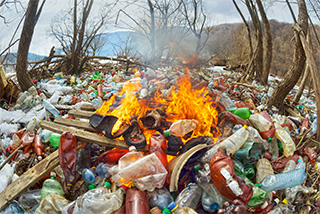Partnerships for Environmental Public Health (PEPH)
July 12, 2022

Household air pollution (HAP) from solid fuel combustion is a major contributor to air pollution and poor health. In low- and middle-income countries, household waste burning, especially of plastics, is a major but unaddressed environmental and health hazard in countries that lack infrastructure to properly dispose of waste.
Burning plastic leads to the generation and release of secondary pollutants such as microplastics and air toxics, including bisphenols and phthalates, which may disrupt neurodevelopment, endocrine, and reproductive function.
The first presentation will focus on a study to use an implementation science approach to implement and evaluate fidelity to intervention strategies to reduce plastic waste burning. The second presentation will describe the community engaged approaches used to facilitate community-informed research to assess exposure to secondary solid and gaseous pollutants as a result of inadequate solid waste management. The presenters will demonstrate examples of the methods and tools they developed to support community engagement in field sampling and preliminary results dissemination.
Experts
Presentation 1: ECOLECTIVOS: A Complex Community-based Intervention to Engage Communities to Reduce Combustion of Plastic Waste in Rural Guatemala

Lisa Thompson, Ph.D., is an associate professor in the Nell Hodgson Woodruff School of Nursing, with a secondary appointment in the Gangarosa Department of Environmental Health in the Rollins School of Public Health at Emory University. She works in a transdisiplinary capacity to strengthen the role of implementation science in the field of environmental health sciences. As a nurse practitioner working in mostly low-income, Spanish-speaking clinical settings for over 15 years, she is an excellent communicator with lay (non-academic) audiences about the connections between human and environmental health. She was recently awarded an NIEHS K12 grant to train clinicians in environmental health.
For the past 20 years she has worked on research projects related to household air pollution in rural Guatemala, starting as a graduate student on the landmark first randomized stove intervention study on infant pneumonia in Guatemala (referred to as the RESPIRE trial, PI: Kirk R. Smith). She is a co-Investigator on the Household Air Pollution Intervention Network (HAPIN) trial, which aims to deliver rigorous evidence regarding the potential health benefits of a liquefied petroleum gas (LPG) stove and free fuel intervention delivered to 3,200 households in Guatemala, Peru, India, and Rwanda. Her research focuses on developing effective behavioral interventions, using implementation science methods, to reduce environmental exposures that can be implemented in real-world settings. She is a Principal Investigator (MPIs: Thompson and Saikawa) of a cluster randomized trial in rural Guatemala, the first NIEHS-funded implementation science study to develop, implement and evaluate community-level working groups that aim to reduce household burning of plastic waste.
Presentation 2: Community-informed Practices for Assessing Exposure to Pollutants Generated From Inadequate Solid Waste Management Practices

Melissa Gonzales, Ph.D., is incoming chair of the Department of Environmental Health Sciences at the Tulane School of Public Health and Tropical Medicine. As an environmental health scientist with expertise in exposure assessment, Gonzales' population-based research focuses on 1) understanding the contribution of environmental exposure to health disparities; 2) rural and minority health; and 3) the translation of research. She has contributed to several National Academies committee reports including the recent Guidance on PFAS Exposure, Testing and Clinical Follow-up. Gonzales received her M.S. in toxicology/Industrial hygiene from the University of Arizona and her Ph.D. in environmental health from the University of California Berkeley School of Public Health.

Joseph Hoover, Ph.D., is an incoming assistant professor in the Department of Environmental Science and core faculty member for the Indigenous Resilience Center at the University of Arizona. As a geographer and environmental scientist, Hoover’s line of research emphasizes 1) spatial modeling of potential exposure to environmental contaminants, principally through drinking water; 2) visualization and communication of chemical, environmental, and water quality information; and 3) health impacts of environmental exposures. Hoover received his Ph.D. in geography from the University of Denver and completed an NIGMS funded IRACDA post-doctoral fellowship with the Community Environmental Health Program at the University of New Mexico Health Sciences Center.
We Want Your Feedback!
Send comments, questions, and suggestions for future webinar topics to [email protected].


